In what Christianity Today has called “Christian camps’ weirdest, hardest summer,” David and Colleen Burroughs faced tough decisions about their own camping program, PASSPORT Inc., which typically engages 5,000 children and youth from about 350 churches in its programs.
Back in April, PASSPORT announced it would move to a virtual format for this summer, breaking a 27-year run of in-person camps that have been held in 56 cities in 17 states and in six countries.
PASSPORT partners include the Cooperative Baptist Fellowship, the Presbyterian Church (USA), the Episcopal Church and the United Methodist Church — all more progressive Christian bodies that value equal calling and service by women and men and an ecumenical theology, two of PASSPORT’s key values.
David and Colleen spoke with Baptist News Global about the challenges of this COVID-19 summer and how they have adapted.
You came to a decision about not holding in-person camps this year fairly early, in April. What was happening behind the scenes in making that decision, and why were you able to get ahead of what we now know was an inevitable decision?
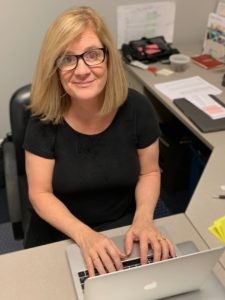
Colleen Burroughs
Colleen: Deciding not to hold in-person camps came down to the same dual question our country continues to wrestle with: Do we risk lives or livelihood? Behind the scenes, our operations team started tracking coronavirus data in February, raising early alarm even as people thought it might subside in the hotter summer months. But our inability to predict hotspots in the South meant too great a risk of someone bringing the virus to our summer teams or taking it back home to an immunocompromised relative.
We made the call to cancel early for two reasons. First, we wanted to give the more than 60 impressive young adults we had hired for the summer an opportunity to find a new position or the time to sign up for summer school. Two, our office needed all the lead time we could get to immediately pivot and try to provide digital resources for our registered churches. Student ministers’ summer calendars were about to change dramatically, and not just because their week of camp was canceled.
Some big evangelical camps and camps tied to megachurches tried to carry on this summer with loads of precautions but with often disastrous outcomes, even canceling camps in mid-week. How do these reports affirm the difficult decision you made back in April?
David: A few of those bigger camps are tied to one church, or one local community, so there could be a case made for having a camp, if the infection rates had fallen for two weeks in their community. But because PASSPORT is a national ministry, with multiple states present for each session of camp, there is a bigger geographical footprint, which we felt increased the risk for our campers and their families.
This higher risk is because states had different timelines for the infection spikes, as there was no national policy about sheltering in place or wearing masks. I don’t fault those camps for wanting to host campers; many of these camps get all their income in just two short summer months. So there was great pressure to keep open if at all possible. We felt that pressure as well but decided it was best to be on the safe side.
What kind of pushback or affirmation did you receive from participating churches, families or donors because of your decision?
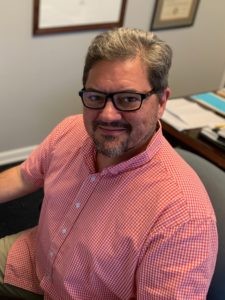
David Burroughs
David: Once we announced our decision, we received a few emails from parents frustrated with our decision, because they felt like the virus would disappear once the warmer summer months came. But overwhelmingly, our youth and children’s ministers offered words of affirmation and understanding. While disappointed not to be able to bring students, they agreed we had made the safest choice.
The first step toward a future for PASSPORT was asking our partner churches to allow us to keep the deposits they had paid, even as we had to cancel camp. We sent an email explaining that we had spent those deposits on the research and development for camp, recruiting and hiring our summer staffers, and the general expenses of our ministry in the winter months. We did offer a path for churches to apply for their deposits back, but less than 5% did so. We see this as a strong affirmation that our partner churches believe in the long-term ministry of PASSPORT. We remain really grateful for their continued support.
You adapted to a virtual camp format this summer. What did that mean, and how did you make this happen?
Colleen: Because the deposits for camp already had been invested in the summer, we wanted to try and provide as many resources to our churches as possible. With varied ability to gather in groups, there was no one-size-fits-all approach. Our design team chose to offer a menu of resources by taking what is normally one intense week of programming and dividing it out over six weeks.

The hosts for this summer’s virtual camp talent show at PASSPORT.
This “Season of PASSPORT” offered things like three weekly videos, Bible studies, dance challenges, pastor messages, webinars and daily devotions on our free d365 website and phone app. We generated downloadable resources for Zoom-weary families and printable resources and T-shirt art. The youth version offered an ability to interact a little more widely on social media, while the kids’ version was more digitally secure.
We also produced a six-week Variety Show, featuring acts submitted by campers, inviting our network to gather around their screens every Thursday night. Some youth groups would gather in the parking lot to watch.
What were some of the challenges or successes of this different format? What’s your own evaluation?
Colleen: Challenges — learning to work as a team virtually. Creating an unimagined program for a constantly changing landscape that included a pandemic and national unrest. A really short deadline. Oh, and everyone had to learn new writing, production, filming and editing skills. Sometimes we just had to laugh!
My personal evaluation is that I am so proud of our national team and what we were able to come up with. We probably overshot. We doubt all of our churches chose to use everything we put out there. But from what it looks like and what we are hearing the “Season of PASSPORT” has been well received.
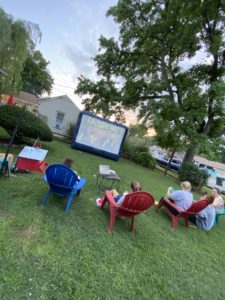
Youth from Talbot Park Baptist Church Youth in Norfolk, Va., watch the camp talent show on the front lawn of a home. (Photo: Michelle Brody)
How were you able to carry on with PASSPORT’s core values such as student leadership and camper involvement in this different format?
David: Our amazing student leaders are the heart of PASSPORT each summer. We tried to include as many of our summer staff as possible, and everyone who was asked showed up in wonderful ways. More than half our 2020 staffers were able to jump in for some portion of our virtual summer. Our preachers offered video messages, our musicians sang together to bring worship songs to life, and a team of staffers hosted students in Zoom conversations across the summer.
Campers participated individually and as groups participating in live webinars, answering our questions of the week via video, sharing stories about volunteering locally and sending in acts for the variety shows. Teenage students participated in dance challenges on social media platforms and children sent in weekly memorized Bible verses to our Scripture mascot “Lampy.”
PASSPORT normally employs a large number of young adults as camp leaders and counselors. What happened to all those would-be summer workers this year?
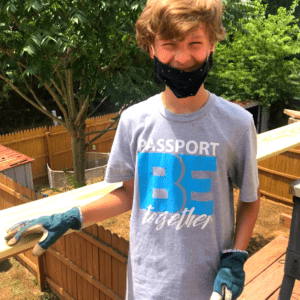
Jackson, a student from Fredericksburg Baptist Church, volunteering hard work on a mission site.
David: It was hard telling our 64 summer staffers that we would not have jobs for them this summer. There are so many great things that happen on these summer teams — leadership development, vocational discernment and focused ministry with students.
Part of the reason we canceled early was to allow our summer staffers time to sign up for summer classes or apply for internships or jobs. We partnered with CBF’s Student.go and Student.church, and several of our students filled openings in those programs serving CBF field personnel remotely, and serving churches as youth and children’s interns. We also hired several interns who helped us make the virtual “Season of PASSPORT” a success.
Obviously, PASSPORT is the kind of operation that makes most of its annual income in the summer. How has the loss of so much summer income affected the bottom line and the future viability for the organization?
David: PASSPORT takes in about 75% of our income each June. A good portion of this goes to our host campuses for room and board, but we maintain a full administrative office all year to produce each summer’s programming. Bottom line, we will need to raise $400,000 by the end of this year in order to survive.
Already this summer, several churches have given gifts to support PASSPORT. The youth of Second Baptist Church in Memphis donated all the money from their annual camp and mission trip fundraiser, $12,500. A group of staff alumni and church leaders have created the (BE)cause campaign to help us raise some of that deficit. CBF state organizations have been challenged by South Carolina coordinator Jay Kieve, to make a gift of support to PASSPORT. At the request of our board of directors, I will be calling on all our donors this fall. We are prayerfully trusting that the support we need will be found.
How was PASSPORT perhaps better prepared for a contingency plan than other Christian camps might have been?
Colleen: I’m not sure we were better prepared. I will say that PASSPORT is a relatively small organization which, we like to think, makes us a bit more nimble. We have responded to multiple disasters, mobilizing campers after hurricanes in New Orleans, Louisiana and Beaumont, Texas. We have crawled through a week in Boston where students brought the swine flu to camp, crippling an entire summer team and canceling a week of mission work. When the Twin Towers fell, PASSPORT created d365.org, an ad-free devotional site for spiritual reflection and pastoral care to our students. It now hosts 2.8 million visits annually. During each of those dark moments in our history, it was hard to imagine anything more devastating, but with God’s help we got through it.
Although no one would have wanted camps to be cancelled the way COVID-19 demanded this year, what lessons might you have learned through this year’s experience? How might this change the way you operate in the future?
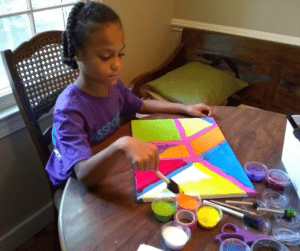
Ezra, a student from First Baptist Church. Greensboro, N.C., participating in a PASSPORTkids arts and crafts activity.
David: Along with much of the nation, we learned how to successfully work remotely. We learned that our partner churches want to engage their children and youth and will work with us, trying new things along the way to minister to their students and families. We learned again about success and failure, watching some things work well and a few fall flat this virtual summer.
Your website is promoting dates and camps for summer 2021. How hopeful are you that you’ll be back to “normal” next summer, and what would “normal” mean now?
Colleen: Very hopeful. We have to have hope! By August, our team is usually half way down the field for planning the following summer’s programming. The good news is, unlike in the spring, we have nine months to learn from schools, churches and sports programs as they work to re-open safely. We’ve got a little more lead time to re-imagine our programming, our schedules and our gathering spaces to adjust to new safety standards.
David: For 2021, we are creating multiple paths for how camp might look, from opening fully to some hybrid middle way, to another virtual summer. We want to do everything we can to hold in-person programs again in 2021.
Colleen: And, as we wait for a vaccine to open up the world again, we are also considering how to offer scalable models of student ministry for multi-context use. It is not the first time Passport has had to shift gears to meet a challenge.
